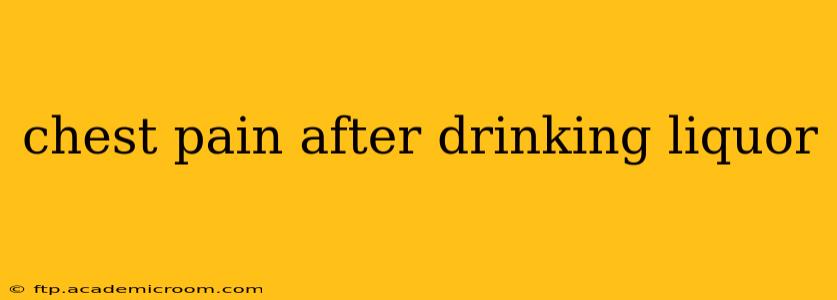Experiencing chest pain after drinking alcohol can be alarming. While sometimes it's a minor issue easily resolved, it can also signal a serious medical condition requiring immediate attention. This comprehensive guide explores the potential causes of chest pain following alcohol consumption, when you should seek medical help, and how to prevent future occurrences.
What Causes Chest Pain After Drinking Alcohol?
Several factors can contribute to chest pain after consuming alcoholic beverages. The pain's location, intensity, and accompanying symptoms can help pinpoint the underlying cause.
1. Acid Reflux (Gastroesophageal Reflux Disease or GERD): Alcohol relaxes the lower esophageal sphincter, allowing stomach acid to flow back into the esophagus. This can cause a burning sensation in the chest, often mistaken for heartburn.
2. Heartburn: Similar to GERD, heartburn is a common symptom of acid reflux and is often aggravated by alcohol consumption. The burning sensation typically occurs behind the breastbone and can radiate to the neck or throat.
3. Anxiety or Panic Attacks: Alcohol can exacerbate anxiety, potentially triggering panic attacks. These attacks manifest as chest pain, shortness of breath, rapid heartbeat, and feelings of impending doom. The chest pain associated with anxiety is often sharp and constricting.
4. Esophageal Spasms: Alcohol can irritate the esophagus, leading to painful spasms. These spasms can cause sudden, intense chest pain that may feel like a squeezing or crushing sensation.
5. Cardiac Issues (Rare but Serious): While less common, chest pain after drinking could indicate a serious cardiac problem, such as angina (chest pain due to reduced blood flow to the heart) or a heart attack. These conditions usually present with additional symptoms like shortness of breath, sweating, nausea, and jaw pain. It's crucial to seek immediate medical help if you suspect a cardiac event.
6. Gallbladder Problems: Alcohol can trigger gallbladder contractions, causing pain in the upper right abdomen that can radiate to the chest. This is often associated with nausea and vomiting.
Does Alcohol Always Cause Chest Pain?
No, alcohol doesn't always cause chest pain. Many individuals can consume alcohol without experiencing any discomfort. However, pre-existing conditions and individual sensitivities play a significant role. People with GERD, anxiety disorders, or heart conditions are more likely to experience chest pain after drinking.
How Long Does Chest Pain From Alcohol Last?
The duration of chest pain varies depending on the cause. Acid reflux and heartburn symptoms might last for several minutes to a few hours. Anxiety-related chest pain can be short-lived or prolonged depending on the severity of the attack. If the pain is related to a heart condition, it may persist or even worsen.
When Should I Seek Medical Attention for Chest Pain After Drinking?
Seek immediate medical attention if your chest pain is:
- Severe or intense: Unbearable pain warrants immediate medical intervention.
- Accompanied by other symptoms: Shortness of breath, sweating, nausea, vomiting, jaw pain, or dizziness should prompt an immediate trip to the emergency room.
- Persists for a long time: If the pain doesn't subside after a few hours, consult a doctor.
- Recurrent: If you experience chest pain frequently after drinking, it's crucial to seek medical evaluation to identify the underlying cause.
Can I Prevent Chest Pain After Drinking Alcohol?
While you can't eliminate all risks, several measures can help reduce the likelihood of chest pain:
- Moderate alcohol consumption: Limit the amount of alcohol you drink.
- Avoid triggers: Identify and avoid alcoholic beverages that trigger symptoms.
- Eat before drinking: Food in your stomach can help buffer the effects of alcohol on your digestive system.
- Stay hydrated: Drink plenty of water throughout the day, especially if you're consuming alcohol.
- Manage underlying conditions: If you have GERD, anxiety, or other conditions, effectively managing them can minimize your risk of chest pain.
- Consider alcohol alternatives: Choose non-alcoholic beverages instead of alcohol if you're prone to chest pain.
Disclaimer: This information is for educational purposes only and should not be considered medical advice. Always consult a healthcare professional for diagnosis and treatment of any medical condition.
